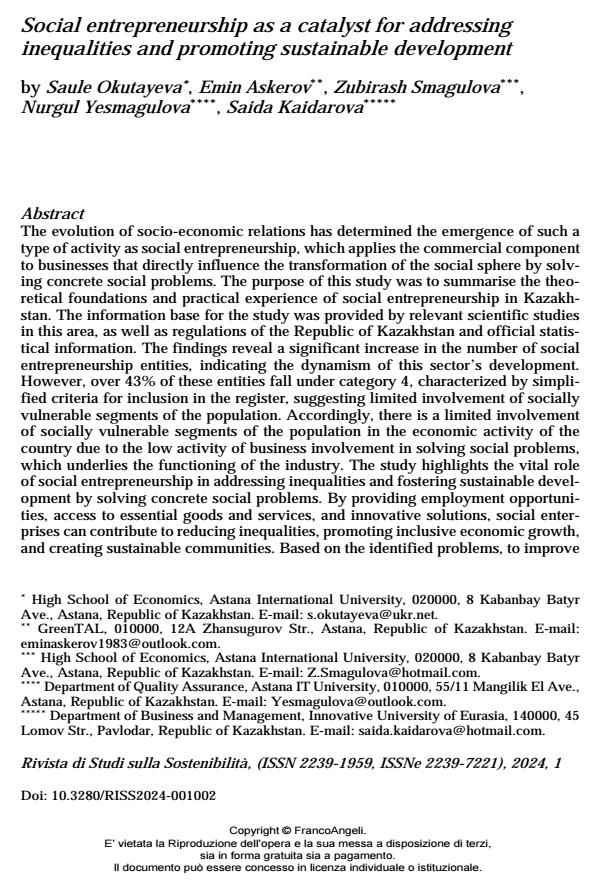Social entrepreneurship as a catalyst for addressing inequalities and promoting sustainable development
Journal title RIVISTA DI STUDI SULLA SOSTENIBILITA'
Author/s Saule Okutayeva, Emin Askerov, Zubirash Smagulova, Nurgul Yesmagulova, Saida Kaidarova
Publishing Year 2024 Issue 2024/1
Language English Pages 15 P. 11-25 File size 156 KB
DOI 10.3280/RISS2024-001002
DOI is like a bar code for intellectual property: to have more infomation
click here
Below, you can see the article first page
If you want to buy this article in PDF format, you can do it, following the instructions to buy download credits

FrancoAngeli is member of Publishers International Linking Association, Inc (PILA), a not-for-profit association which run the CrossRef service enabling links to and from online scholarly content.
The evolution of socio-economic relations has determined the emergence of such a type of activity as social entrepreneurship, which applies the commercial com-ponent to businesses that directly influence the transformation of the social sphere by solving concrete social problems. The purpose of this study was to summarise the theoretical foundations and practical experience of social entrepreneurship in Kazakhstan. The information base for the study was provided by relevant scien-tific studies in this area, as well as regulations of the Republic of Kazakhstan and official statistical information. The findings reveal a significant increase in the number of social entrepreneurship entities, indicating the dynamism of this sector’s development. However, over 43% of these entities fall under category 4, charac-terized by simplified criteria for inclusion in the register, suggesting limited involvement of socially vulnerable segments of the population. Accordingly, there is a limited involvement of socially vulnerable segments of the population in the economic activity of the country due to the low activity of business involvement in solving social problems, which underlies the functioning of the industry. The study highlights the vital role of social entrepreneurship in addressing inequalities and fostering sustainable development by solving concrete social problems. By providing employment opportunities, access to essential goods and services, and innovative solutions, social enterprises can contribute to reducing inequalities, promoting inclusive economic growth, and creating sustainable communities. Based on the identified problems, to improve the efficiency of social entrepreneur-ship functioning, this study offered practical recommendations aimed at improv-ing administrative and regulatory mechanisms.
Keywords: business, entrepreneur, socially vulnerable population, sustainable development, social problems, state support.
Saule Okutayeva, Emin Askerov, Zubirash Smagulova, Nurgul Yesmagulova, Saida Kaidarova, Social entrepreneurship as a catalyst for addressing inequalities and promoting sustainable development in "RIVISTA DI STUDI SULLA SOSTENIBILITA'" 1/2024, pp 11-25, DOI: 10.3280/RISS2024-001002